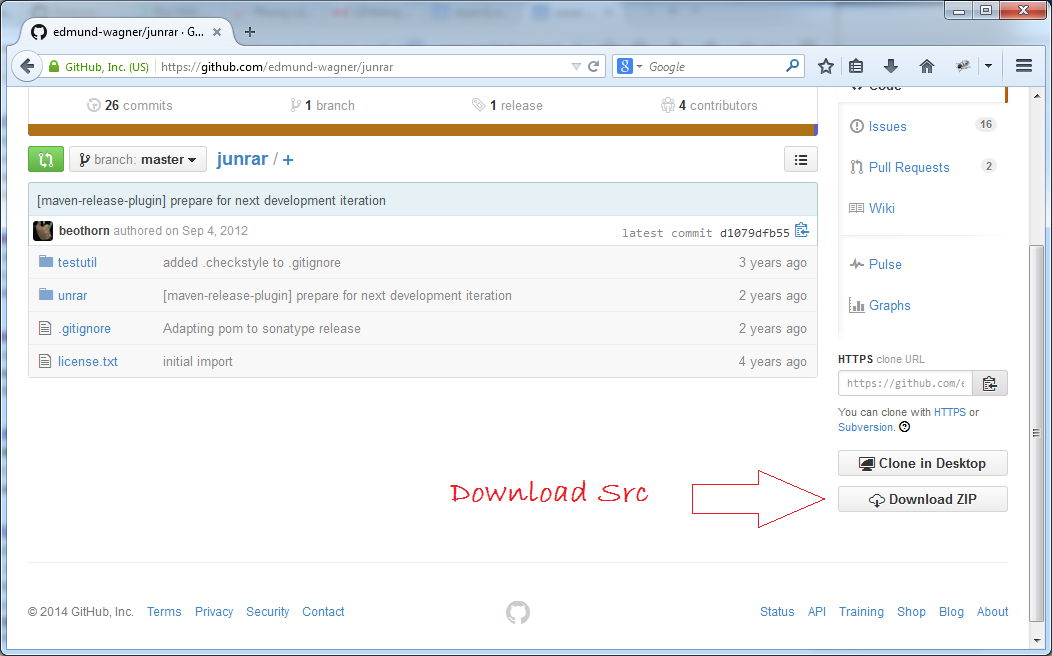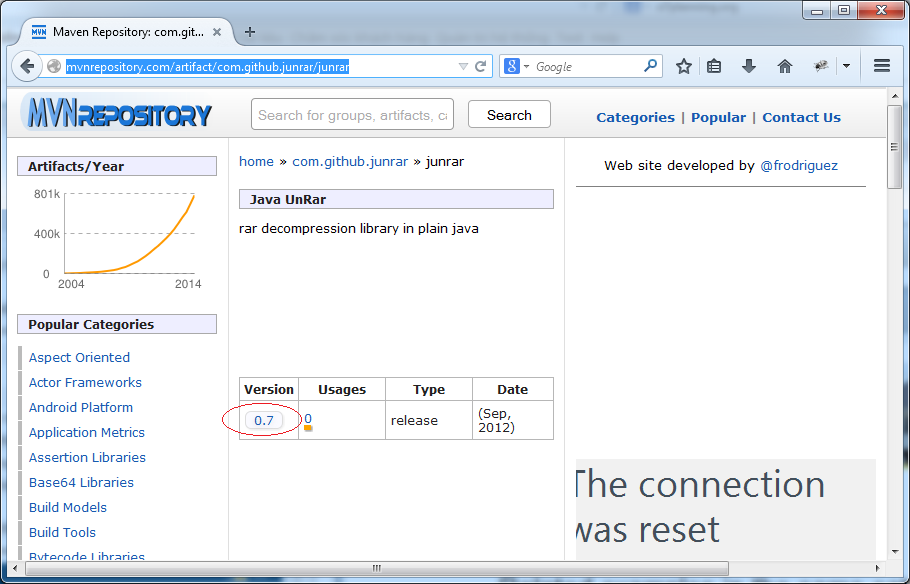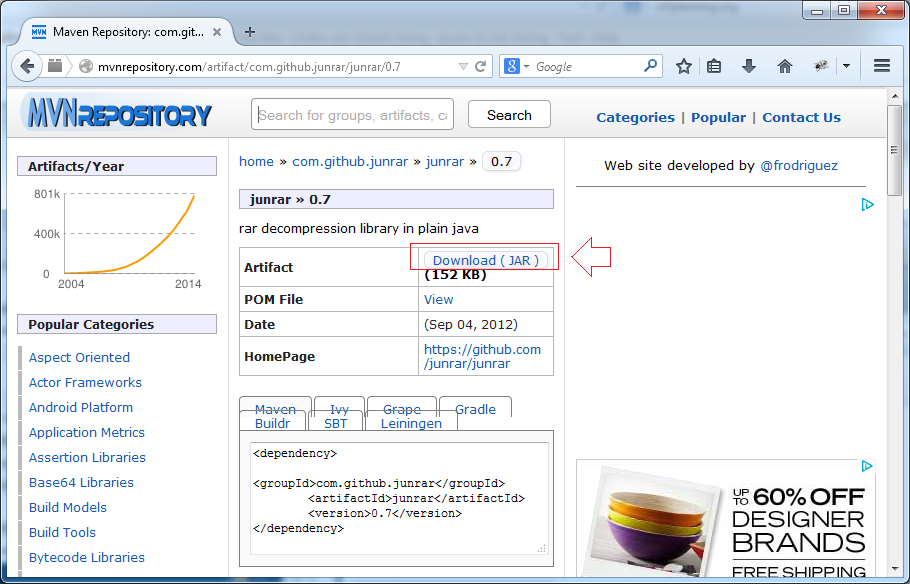Java Compression and Decompression Tutorial with Examples
1. Read write the zip file using java.util.zip
No ADS
To compress and decompress files, JDK give you package 'java.util.zip' with some class to do this.
Unfortunately, this library can not compress and decompress the popular formats like RAR, or 7zip. For the use of the format rar, 7zip, .. you need a different library. In this document I have to refer to the library to do this.
Unfortunately, this library can not compress and decompress the popular formats like RAR, or 7zip. For the use of the format rar, 7zip, .. you need a different library. In this document I have to refer to the library to do this.
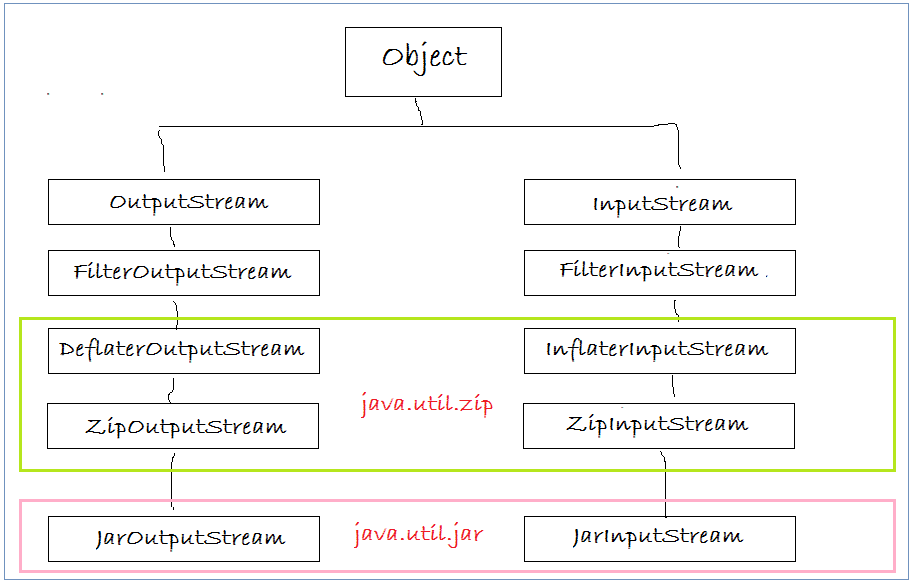
View a zip file is opened using WinRAR tool.
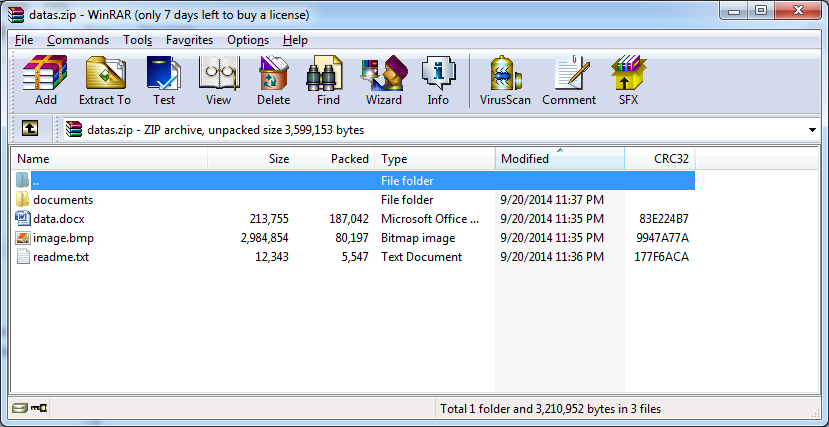
java.util.zip define files in the zip file is the ZipEntry.
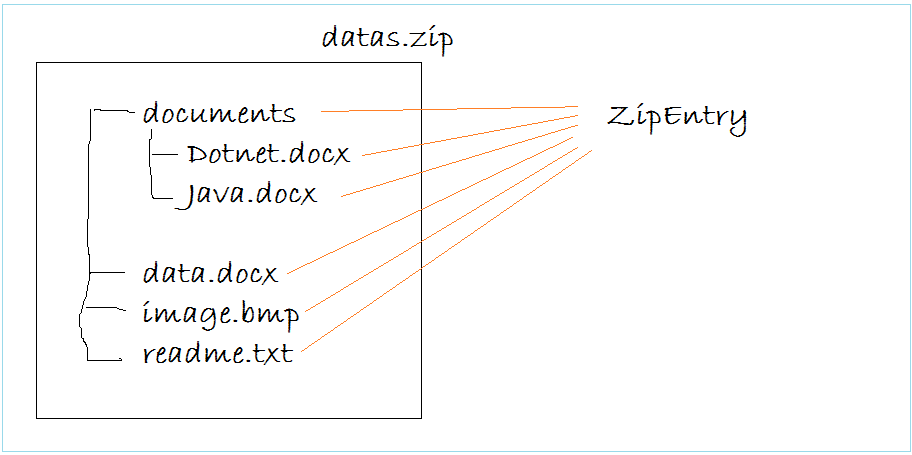
ListZipEntriesDemo.java
package org.o7planning.tutorial.javaiozip;
import java.io.FileInputStream;
import java.util.zip.ZipEntry;
import java.util.zip.ZipInputStream;
public class ListZipEntriesDemo {
public static void main(String[] args) {
String FILE_PATH = "C:/test/datas.zip";
ZipInputStream zipIs = null;
try {
// Create ZipInputStream object to read zip file.
zipIs = new ZipInputStream(new FileInputStream(FILE_PATH));
ZipEntry entry = null;
// Fetch entries (From Top to Bottom)
while ((entry = zipIs.getNextEntry()) != null) {
if (entry.isDirectory()) {
System.out.print("Directory: ");
} else {
System.out.print("File: ");
}
System.out.println(entry.getName());
}
} catch (Exception e) {
e.printStackTrace();
} finally {
try {
zipIs.close();
} catch (Exception e) {
}
}
}
}Results of running the example:

For example, unzip the zip file to a specific folder:
UnZipDemo.java
package org.o7planning.tutorial.javaiozip;
import java.io.File;
import java.io.FileInputStream;
import java.io.FileOutputStream;
import java.util.zip.ZipEntry;
import java.util.zip.ZipInputStream;
public class UnZipDemo {
public static void main(String[] args) {
final String OUTPUT_FOLDER = "C:/output";
String FILE_PATH = "C:/test/datas.zip";
// Create Output folder if it does not exists.
File folder = new File(OUTPUT_FOLDER);
if (!folder.exists()) {
folder.mkdirs();
}
// Create a buffer.
byte[] buffer = new byte[1024];
ZipInputStream zipIs = null;
try {
// Create ZipInputStream object to read a file from path.
zipIs = new ZipInputStream(new FileInputStream(FILE_PATH));
ZipEntry entry = null;
// Read ever Entry (From top to bottom until the end)
while ((entry = zipIs.getNextEntry()) != null) {
String entryName = entry.getName();
String outFileName = OUTPUT_FOLDER + File.separator + entryName;
System.out.println("Unzip: " + outFileName);
if (entry.isDirectory()) {
// Make directories.
new File(outFileName).mkdirs();
} else {
// Create Stream to write file.
FileOutputStream fos = new FileOutputStream(outFileName);
int len;
// Read the data on the current entry.
while ((len = zipIs.read(buffer)) > 0) {
fos.write(buffer, 0, len);
}
fos.close();
}
}
} catch (Exception e) {
e.printStackTrace();
} finally {
try {
zipIs.close();
} catch (Exception e) {
}
}
}
}Results of running the example:

Compress a directory
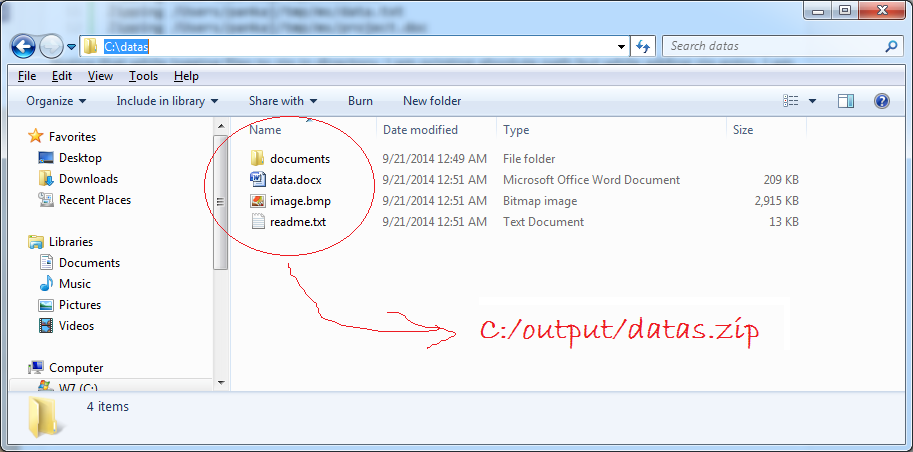
ZipDirectory.java
package org.o7planning.tutorial.javaiozip;
import java.io.File;
import java.io.FileInputStream;
import java.io.FileOutputStream;
import java.io.IOException;
import java.io.OutputStream;
import java.util.ArrayList;
import java.util.List;
import java.util.zip.ZipEntry;
import java.util.zip.ZipOutputStream;
public class ZipDirectory {
public ZipDirectory() {
}
// A method to Compress a directory.
public void zipDirectory(File inputDir, File outputZipFile) {
// Create parent directory for the output file.
outputZipFile.getParentFile().mkdirs();
String inputDirPath = inputDir.getAbsolutePath();
byte[] buffer = new byte[1024];
FileOutputStream fileOs = null;
ZipOutputStream zipOs = null;
try {
List<File> allFiles = this.listChildFiles(inputDir);
// Create ZipOutputStream object to write to the zip file
fileOs = new FileOutputStream(outputZipFile);
//
zipOs = new ZipOutputStream(fileOs);
for (File file : allFiles) {
String filePath = file.getAbsolutePath();
System.out.println("Zipping " + filePath);
// entryName: là một đường dẫn tương đối.
String entryName = filePath.substring(inputDirPath.length() + 1);
ZipEntry ze = new ZipEntry(entryName);
// Put new entry into zip file.
zipOs.putNextEntry(ze);
// Read the file and write to ZipOutputStream.
FileInputStream fileIs = new FileInputStream(filePath);
int len;
while ((len = fileIs.read(buffer)) > 0) {
zipOs.write(buffer, 0, len);
}
fileIs.close();
}
} catch (IOException e) {
e.printStackTrace();
} finally {
closeQuite(zipOs);
closeQuite(fileOs);
}
}
private void closeQuite(OutputStream out) {
try {
out.close();
} catch (Exception e) {
}
}
// This method returns the list of files,
// including the children, grandchildren files of the input folder.
private List<File> listChildFiles(File dir) throws IOException {
List<File> allFiles = new ArrayList<File>();
File[] childFiles = dir.listFiles();
for (File file : childFiles) {
if (file.isFile()) {
allFiles.add(file);
} else {
List<File> files = this.listChildFiles(file);
allFiles.addAll(files);
}
}
return allFiles;
}
public static void main(String[] args) {
ZipDirectory zipDir = new ZipDirectory();
File inputDir = new File("C:/datas");
File outputZipFile = new File("C:/output/datas.zip");
zipDir.zipDirectory(inputDir, outputZipFile);
}
}Results of running the example:

2. Read write the jar file using java.util.jar
No ADS
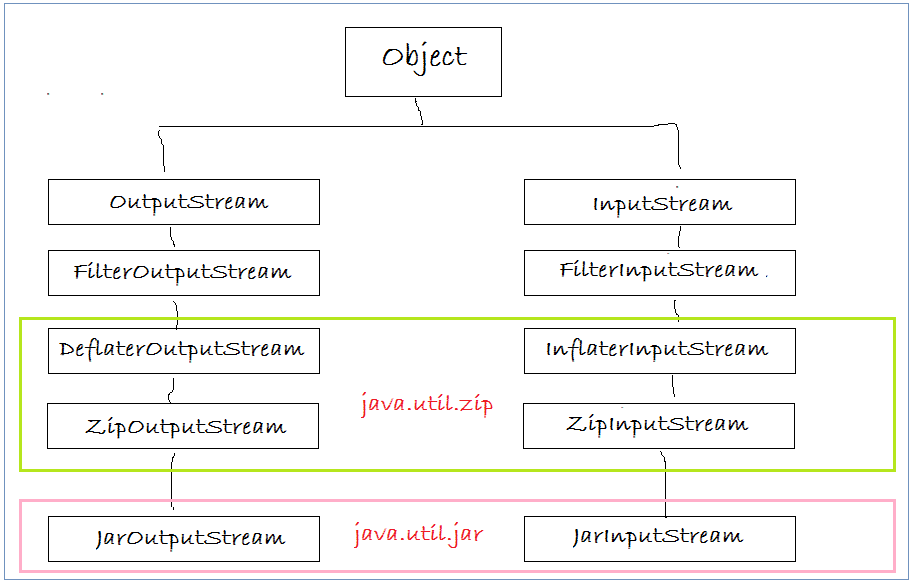
Basically read, write jar file is not any different than reading, writing Zip file.
- JarInputStream extends from ZipInputStream, supports more methods to read MANIFEST information.
- JarOutputStream extends from ZipOutputStream,supports more more method to write MANIFEST information
Example Manifest:
META-INF/MANIFEST.MF
Manifest-Version: 1.0
Bundle-ManifestVersion: 2
Bundle-Name: RAPWorkbenchTutorial
Bundle-SymbolicName: RAPWorkbenchTutorial;singleton:=true
Bundle-Version: 1.0.0.qualifier
Bundle-Activator: rapworkbenchtutorial.Activator
Require-Bundle: org.eclipse.rap.ui;bundle-version="2.3.0",
org.apache.felix.gogo.command;bundle-version="0.10.0",
org.apache.felix.gogo.runtime;bundle-version="0.10.0",
org.apache.felix.gogo.shell;bundle-version="0.10.0",
org.eclipse.equinox.console;bundle-version="1.1.0",
org.eclipse.equinox.http.jetty;bundle-version="3.0.200",
org.eclipse.equinox.ds;bundle-version="1.4.200",
org.eclipse.rap.rwt.osgi;bundle-version="2.3.0",
org.eclipse.rap.design.example;bundle-version="2.3.0"
Bundle-RequiredExecutionEnvironment: JavaSE-1.7
Bundle-ActivationPolicy: lazyFor example, open a jar file with Winrar:
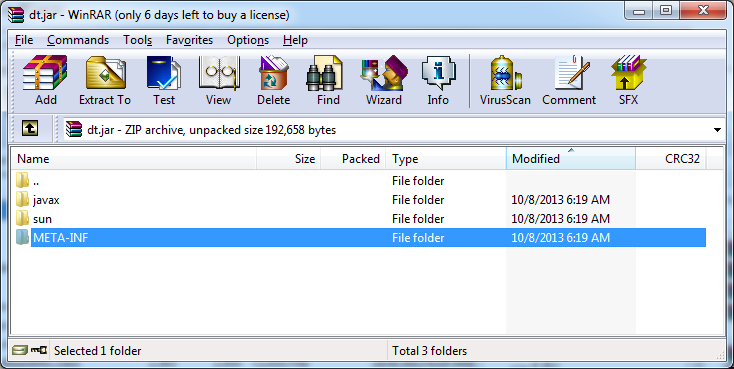
The entities in the jar file is considered to be the JarEntry.
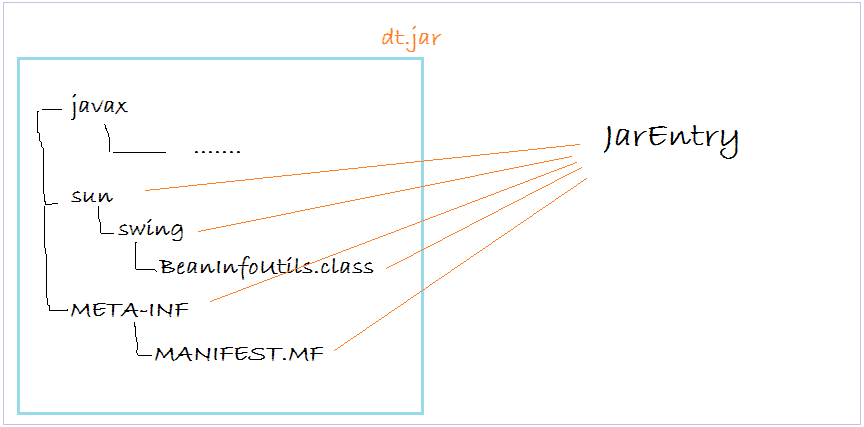
A example of reading information MANIFEST file. Here are the contents of a simple Manifest file.
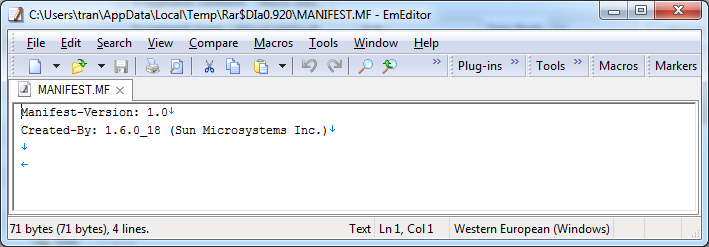
ReadJarFileDemo.java
package org.o7planning.tutorial.jar;
import java.io.FileInputStream;
import java.util.jar.Attributes;
import java.util.jar.JarEntry;
import java.util.jar.JarInputStream;
import java.util.jar.Manifest;
public class ReadJarFileDemo {
public static void main(String[] args) {
String FILE_PATH = "C:/DevPrograms/Java/jdk1.7.0_45/lib/dt.jar";
JarInputStream zipIs = null;
try {
// Create JarInputStream object to read jar file.
zipIs = new JarInputStream(new FileInputStream(FILE_PATH));
// Read manifest information:
Manifest manifest = zipIs.getManifest();
Attributes atts = manifest.getMainAttributes();
String version = atts.getValue("Manifest-Version");
String createdBy = atts.getValue("Created-By");
System.out.println("Manifest-Version:" + version);
System.out.println("Created-By:" + createdBy);
System.out.println("========================");
JarEntry entry = null;
// Read ever Entry (From top to bottom until the end)
while ((entry = zipIs.getNextJarEntry()) != null) {
if (entry.isDirectory()) {
System.out.print("Folder: ");
} else {
System.out.print("File: ");
}
System.out.println(entry.getName());
}
} catch (Exception e) {
e.printStackTrace();
} finally {
try {
zipIs.close();
} catch (Exception e) {
}
}
}
}Results of running the example:

3. Handle RAR file
No ADS
To handle RAR file you need a open source code library. You can use one of the following libraries which is arranged in order of quality priority.
No ADS
Java Basic
- Data Types in java
- Java PhantomReference Tutorial with Examples
- JDK Javadoc in CHM format
- Java Stream Tutorial with Examples
- Java Predicate Tutorial with Examples
- Java BiConsumer Tutorial with Examples
- Arrays in Java
- JDBC Driver Libraries for different types of database in Java
- Abstract class and Interface in Java
- Java Commons Email Tutorial with Examples
- Install Eclipse
- Bitwise Operations
- Install Eclipse on Ubuntu
- Configuring Eclipse to use the JDK instead of JRE
- Java Commons Logging Tutorial with Examples
- Java Enums Tutorial with Examples
- Loops in Java
- Java Regular Expressions Tutorial with Examples
- Install Java on Ubuntu
- Quick Learning Java for beginners
- Install Java on Windows
- Comparing and Sorting in Java
- Inheritance and polymorphism in Java
- Java Consumer Tutorial with Examples
- Java String, StringBuffer and StringBuilder Tutorial with Examples
- Java Exception Handling Tutorial with Examples
- Example of Java encoding and decoding using Apache Base64
- if else statement in java
- Switch Statement in Java
- Java Supplier Tutorial with Examples
- Java Programming for team using Eclipse and SVN
- Java JDBC Tutorial with Examples
- Java remote method invocation - Java RMI Tutorial with Examples
- Java Multithreading Programming Tutorial with Examples
- Customize java compiler processing your Annotation (Annotation Processing Tool)
- What is needed to get started with Java?
- Java Aspect Oriented Programming with AspectJ (AOP)
- Understanding Java System.identityHashCode, Object.hashCode and Object.equals
- Java Compression and Decompression Tutorial with Examples
- Java Reflection Tutorial with Examples
- Install OpenJDK on Ubuntu
- Java String.format() and printf() methods
- History of Java and the difference between Oracle JDK and OpenJDK
- Introduction to the Raspberry Pi
- Java Socket Programming Tutorial with Examples
- Java Generics Tutorial with Examples
- Manipulating files and directories in Java
- Java WeakReference Tutorial with Examples
- Java Commons IO Tutorial with Examples
- History of bits and bytes in computer science
- Which Platform Should You Choose for Developing Java Desktop Applications?
- Java SoftReference Tutorial with Examples
- Syntax and new features in Java 8
- Java Annotations Tutorial with Examples
- Java Function Tutorial with Examples
- Access modifiers in Java
- Java BiFunction Tutorial with Examples
- Get the values of the columns automatically increment when Insert a record using JDBC
- Java Functional Interface Tutorial with Examples
- Java BiPredicate Tutorial with Examples
Show More
- Java Servlet/Jsp Tutorials
- Java Collections Framework Tutorials
- Java API for HTML & XML
- Java IO Tutorials
- Java Date Time Tutorials
- Spring Boot Tutorials
- Maven Tutorials
- Gradle Tutorials
- Java Web Services Tutorials
- Java SWT Tutorials
- JavaFX Tutorials
- Java Oracle ADF Tutorials
- Struts2 Framework Tutorials
- Spring Cloud Tutorials
